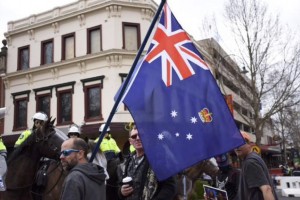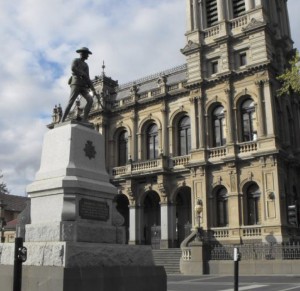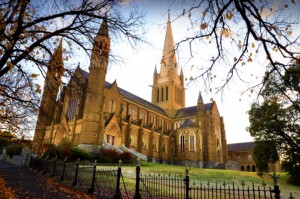Howard’s End. “A Mosque in Bendigo? Or is it; ‘Australia all Over”
Dear reader, the bones of this were assembled several weeks ago, before the change in P.M. Tellingly , the tone has changed. ‘Team Australia’ has been given the boot. We now seek engagement and conciliation as a way of engaging the public in a national conversation we must have. But for provincial Australia, the blurring between church and state, and the attractiveness of the iconic Aussie, hero battler and the bush’s sense of identity is imperilled by that fear of outsiders. I think it is John Howard’s enduring legacy. The reinforcement of insularity and the success of turning Iraq, (with the help of George and Tony) into a festering sore. I have lived in Bendigo for some twenty years. This insight may prove illuminating.
So long as the people of the country are the real Australians, other people are less real. This might be only to say less distinctively Australian, or it might mean out of touch with reality and real people, and not knowing which side their bread is buttered on. Then again it might be an effete, parasitic bludgers; sybarites, late risers, people with no conception of what it is to be at the mercy of the elements, the needs of animals and soils, unreliable markets. E.J Brady, a friend of Henry Lawson and would-be Jack London of the bush, thought bank clerks and their like- the ‘idlers’ and ‘dandies’, ‘pygmies’ and ‘vegetables’ in the cities-were akin to a third sex. Bush people led lives of strength and usefulness”; city life was all ‘weakness and futility’. Bush people people did not need to think this to know this at some level. Don Watson. ‘The Bush’.
The first thing you encounter when arriving in Bendigo by road or train is the mighty Bendigo cathedral. At night from the steps of the gallery you can see the historical pattern of worship. Beautiful local churches, their spires, incandescent and illuminated, marking out the night sky as light pillars of perfect symmetry. The smaller Presbyterian, the Methodist and the Anglican, all beautifully expressing the quiet religious foundation of a grown country town. Hillaire Belloc waxed lyrically in “Path to Rome” the pilgrims progress to the cathedral lights at night. Spirituality beckoned. The same could be said for Bendigo, cept now, not in penitence, but to “outsiders” bussed and trained up to demonstrate a Christian rebuttal to Islam. Well not so Christian, the palpable foot soldiers of Islamiphobia. The Christian brand, post Royal Commission is losing traction. We’ve done a bit more growing up since we’ve lifted the lid on that “old style religion”.
Two councillors objected to a mosque. One Councillor who objected to the planning for Bendigo’s first mosque, last week, during the ‘riot, picnic, fete’, draped herself in the Australian Flag. She chose the site of the war memorial in Pall Mall. Bendigo’s celebrated main street. And she did this deliberately and consciously with all the photographic impact of Cronulla. In photographic terms it’s shorthand for “Crisis”.
To ask the reason why is to draw a half light of the Bendigo of the early Twentieth Century. Steeped in Sacrifice to ‘God, King and Country’. Bendigo has bypassed the growing pangs of the other provincials.
A celebrated Victorian gold city, celebrated nowadays for its spectacular glory, its re- acquainted urbanism, it’s boisterous leaders and its ebullient sense of confidence. The Cathedral, is a personification in bluestone of spiritual heritage and contemporary optimism. But somewhere buried in the DNA set within the whimsical caricatures of St Gill, the rambunctious heady days of Gold are the fragments of the old Bendigo. The Bendigo of mining, and the quiet smoothing of the pillow for the aboriginal inhabitants. And the encouragement post Immigration Restriction Act 1901 for the vast bulk of Chinese immigrants to leave. To, in the words of the 1901 legislators, to ‘Keep Australia Pure’.

Saving us from ‘Islamification’. ‘National Action’ or whatever they call themselves. Queen Victoria would be proud that ‘her flag’ is being so proudly held.
And who’s Australia? Did we pay the original owners for the gold we took? Did we erect those churches to sanctify our new found wealth? Did those politicians then, who founded white Australia, gain respectability and sanctity by a having their names inscribed on granite. Foundations are built on solid ground. In doing so, other less immovable spirits are erased. And do we now look to those churches as beacons of spiritual truth for the here and now? Or are they like old Bendigo, ossified and under-utilised. Perhaps that’s why politicians now use the political process as the pulpit, to compensate for the loss of relevance MOST of us find in that ‘ol kind a religion’. That’s perhaps why the front bench is so ideological, God’s soldiers filling the gap where once the mainstream used to be. And this notion of Australianism and un-Australian. My fathers generation fought fascism to make Australia welcoming. Now it seems it’s only the German’s who’ve learnt fascisms lesson. Being unwelcoming seems to be un-Australian. Deeply and insidiously un-Australian. The original Australians would find my reflections amusing.


